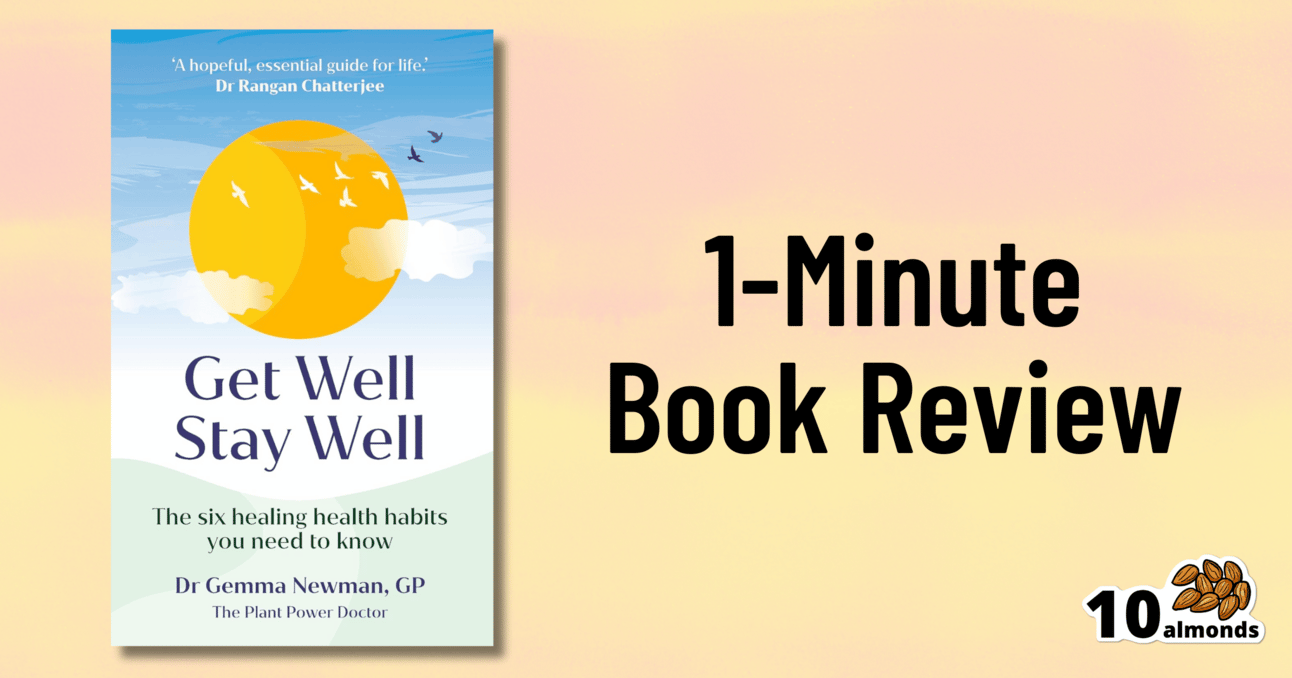
Today’s almonds have been activated by:
Troubleshooting chart:
When you feel like everyone hates you… Sleep
When you feel like you hate everyone… Eat
When you feel like you hate yourself… Shower
⏰ IN A RUSH?
Today’s 30-Second Summary
If you don’t have time to read the whole email today, here are some key takeaways:
The gut is the seat of a lot of things health-related, and that’s (part of) the case with gene expression, too. Which is a pretty big deal!
A gut-healthy diet is of course well-advised
However, even this can be tweaked according to our individual microbiome and epigenetics (see today’s main feature)
Losing weight (healthily!) can be a challenge. Keeping that weight off can be even harder.
Today’s sponsor, the Mayo Clinic Diet, is a medically-backed, globally-trusted method that focuses on changing your daily routine by adding and breaking habits that make a difference to your weight.
Read on to learn more about these things, or click here to visit our archive
🤫 A WORD TO THE WISE
Viruses Aren’t Always Harmful
They’re used in pest control (so, only selectively harmful there), and also in healthcare! Here are six ways they’re used:
👀 WATCH AND LEARN
8 Visible Signs of High Cortisol (15:13)
Stressful menu:
Want to watch it, but not right now? Bookmark it for later 🔖
YOU MAY HAVE MISSED…
How To Recover Quickly From A Stomach Bug
The Vagus Nerve (And How You Can Make Use Of It)
Curing Hiccups And Headaches At Home With Actual Science
❓ MYSTERY ITEM
Hands-Down A Great Investment
Hint: The reviews aren’t split on this one; it’ll give you the keys to healthier happier joints!
DID YOU KNOW…
…that you can reply to any of our emails?
We love to hear from our readers—in fact, we actively encourage it. We want to make our content as relevant to your needs and interests as possible.
So, please do click reply to this email and send us any questions, feedback, or requests!
🧬 MAIN FEATURE
Gene Expression & Gut Health
This is Dr. Tim Spector. After training in medicine and becoming a consultant rheumatologist, he’s turned his attention to medical research, and is these days a specialist in twin studies, genetics, epigenetics, microbiome, and diet.
What does he want us to know?
For one thing: epigenetics are for more than just getting your grandparents’ trauma.
More usefully: there are things we can do to improve epigenetic factors in our body
DNA is often seen as the script by which our body does whatever it’s going to do, but it’s only part of the story. Thinking of DNA as some kind of “magical immutable law of reality” overlooks (to labor the metaphor) script revisions, notes made in the margins, directorial choices, and ad-lib improvizations, as well as the quality of the audience’s hearing and comprehension.
Hence the premise of one of Dr. Spector’s older books, “Identically Different: Why We Can Change Our Genes”
(*in fact, it was his first, from all the way back in 2013, when he’d only been a doctor for 34 years)
Gene expression will trump genes every time, and gene expression is something that can often be changed without getting in there with CRISPR / a big pair of scissors and some craft glue.
How this happens on the micro level is beyond the scope of today’s article; part of it has to do with enzymes that get involved in the DNA transcription process, and those enzymes in turn are despatched or not depending on hormonal messaging—in the broadest sense of “hormonal”; all the body’s hormonal chemical messengers, not just the ones people think of as hormones.
However, hormonal messaging (of many kinds) is strongly influenced by something we can control relatively easily with a little good (science-based) knowledge: the gut.
The gut, the SAD, and the easy
In broad strokes: we know what is good for the gut. We’ve written about it before at 10almonds:
This is very much in contrast with what in scientific literature is often abbreviated “SAD”, the Standard American Diet, which is very bad for the gut.
However, Dr. Spector (while fully encouraging everyone to enjoy an evidence-based gut-healthy diet) wanted to do one better than just a sweeping one-size-fits-all advice, so he set up a big study with 15,000 identical twins; you can read about it here: TwinsUK
The information that came out of that was about a lot more than just gene expression and gut health, but it did provide the foundation for Dr. Spector’s next project, ZOE.
ZOE crowdsources huge amounts of data including individual metabolic responses to standardized meals in order to predict personalized food responses based on individual biology and unique microbiome profile.
In other words, it takes the guesswork out of a) knowing what your genes mean for your food responses b) tailoring your food choices with your genetic expression in mind, and c) ultimately creating a positive feedback loop to much better health on all levels.
Now, this is not an ad for ZOE, but if you so wish, you can…
Get the free ZOE gut health guide (this is good, but generic, gut health information)
Take the ZOE home gut health test (quiz followed by offers of lab tests)
Browse the ZOE Health Academy, its education wing
Want to know more?
Dr. Spector has a bunch of books out, including some that we’ve reviewed previously:
You can also check out our own previous main feature, which wasn’t about Dr. Spector’s work but was very adjacent:
Enjoy!
YOU MAY HAVE MISSED…
When To Take Electrolytes (And When We Shouldn’t!)
Evidence-Based Herbs For Health & Healing
How To Speed Up Recovery After A Workout
❤ OUR SPONSORS MAKE THIS PUBLICATION POSSIBLE
Mayo Clinic Diet: effective, practical, and healthy weight loss
Losing weight (healthily!) can be a challenge. Keeping that weight off can be even harder. But, you don't have to do it alone:
The Mayo Clinic Diet is a medically-backed, globally-trusted method that focuses on changing your daily routine by adding and breaking habits that make a difference to your weight.
The benefits are far more than we could list here, but include:
A new digital platform that has helped members lose 3x more weight
A quick-start "lose it!" phrase, where members can lose 6–12 lbs in 2 weeks
Meal plan options that include healthy keto, high protein, vegetarian, and Mediterranean
See also: General Info | Pricing | How it Works | Free Diet Assessment
Please do visit our sponsors—they help keep 10almonds free
Browse By Category
📖 ONE-MINUTE BOOK REVIEW
Get Well, Stay Well: The Six Healing Health Habits You Need To Know – by Dr. Gemma Newman
Dr. Gemma Newman is a GP (British equivalent of what in America is called a "family doctor") who realized she was functioning great as a diagnostic flowchart interpreter and pill dispensary, but not actually doing much of what she got into the job to do: helping people.
Her patients were getting plenty of treatments, but not getting better. Often, they were getting worse. And she knew why: they come in for treatment for one medical problem, when they have six and a half medical problems probably a stack of non-medical problems that contributed to them,
So, this book sets out to do what she tries to do in her office, but often doesn't have the time: treat the whole person.
In it, she details what areas of life to look at, what things are most likely to contribute to wellness/unwellness (be those things completely in your power or not), and how to—bit by bit—make all the parts better, and keep them that way.
The writing style is conversational, and while it's heavily informed by her professional competence, there's no arcane science here; it's more about the system of bringing everything together harmoniously.
Bottom line: if you think there's more to wellness than can be represented on an annual physicals chart, then this is the book to help you get/keep on top of things.
What did you think of today's newsletter?
Wishing you the very best of health every day,
The 10almonds Team








